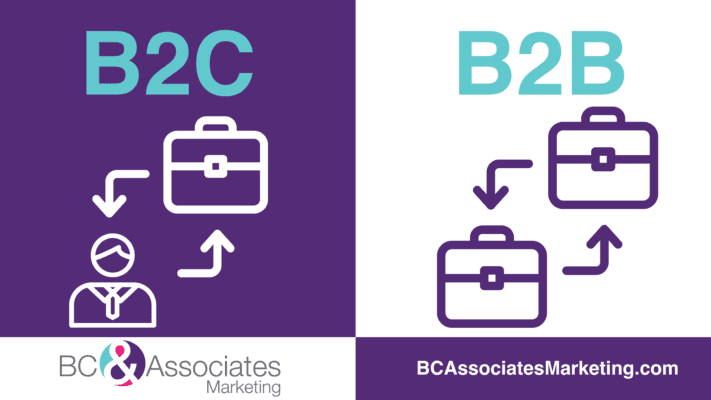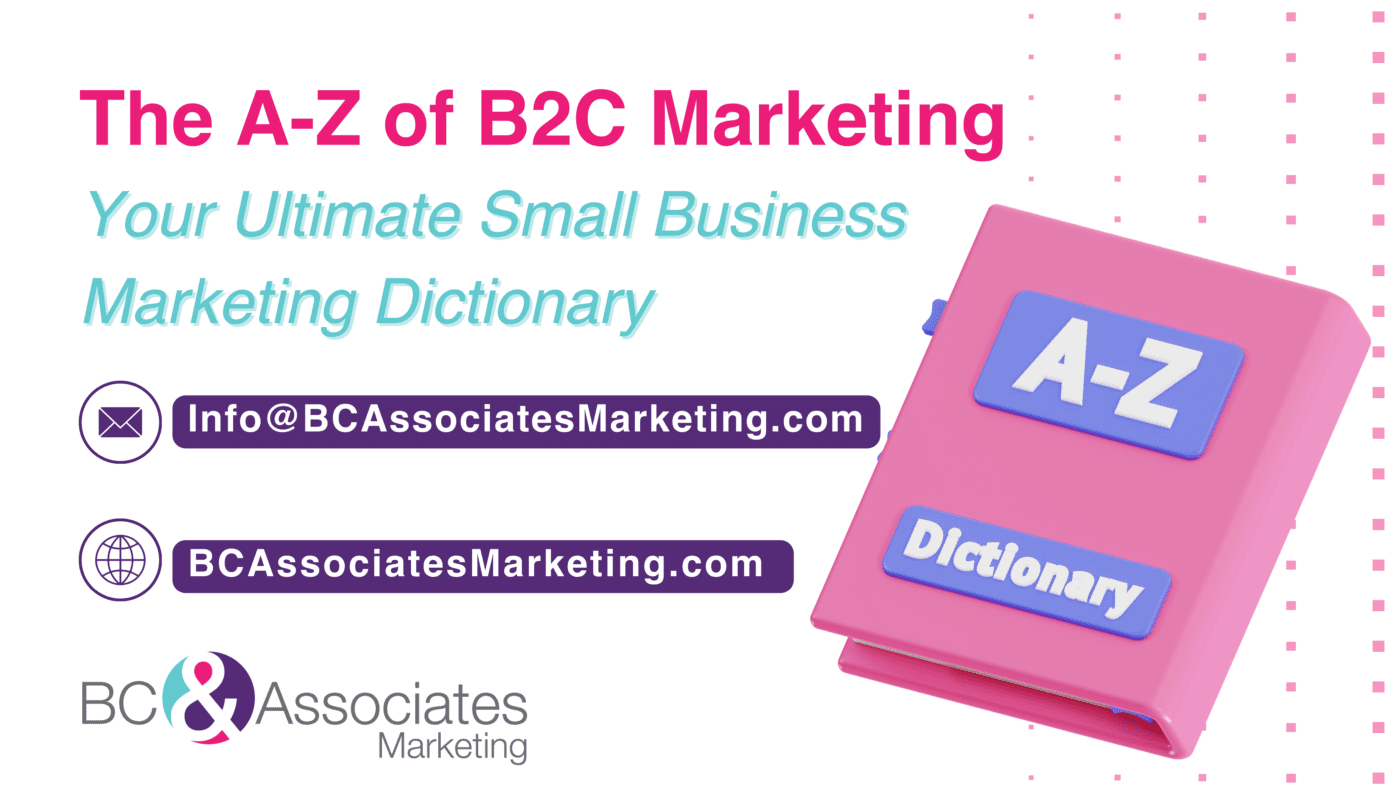Hey there, savvy entrepreneurs! I’m Beverly Cornell, a seasoned marketing maestro with over 25 years of experience in small business marketing and communications. Today, we’re immersing ourselves in the dynamic world of B2C marketing terms.
In the vast landscape of marketing strategies, two distinct approaches are B2C (Business-to-Consumer) and B2B (Business-to-Business) marketing. These methodologies form the backbone of businesses’ outreach efforts, each tailored to the unique dynamics of their target audience.
B2C (Business-to-Consumer) Marketing:
Definition: B2C marketing involves businesses selling products or services directly to consumers. It is characterized by its focus on creating emotional connections, addressing individual needs, and leveraging mass communication channels to reach a broad audience.
Why It Matters: B2C marketing is a cornerstone for businesses targeting individual consumers. Effectively engaging and resonating with consumers can increase sales and brand loyalty and cultivate enduring customer relationships.
B2B (Business-to-Business) Marketing:
Definition: B2B marketing involves businesses selling products or services to other businesses. It is distinguished by longer sales cycles, relationship-building, and a focus on understanding businesses’ unique needs and challenges.
Why It Matters: B2B marketing is paramount for companies operating in the business-to-business space. Building robust relationships, demonstrating value, and providing tailored solutions are essential for securing B2B clients and fostering enduring partnerships.
As we delve into the intricacies of B2C marketing, let’s explore the strategies and nuances that make this approach effective in its own right. Understanding these distinctions is fundamental for businesses seeking to tailor their marketing efforts successfully and achieve long-term success in their respective markets. Brace yourself as we explore our small business marketing dictionary, unveiling key terms and unraveling their importance in transforming your business.

Understanding B2C Marketing Terms: A Comprehensive Dictionary
A – Audience Segmentation:
- Definition: The process of dividing your target market into distinct groups based on specific characteristics.
- Why It Matters: Allows personalized targeting for more effective campaigns, increasing engagement and conversion rates.
B – Branding:
- Definition: The creation and promotion of a distinctive brand identity.
- Why It Matters: Builds brand recognition and fosters customer loyalty, which is crucial for long-term success and differentiation.
C – Content Marketing:
- Definition: Creating and sharing valuable content to attract and engage a target audience.
- Why It Matters: Establishes authority and nurtures customer relationships, driving brand trust and loyalty.
D – Digital Marketing:
- Definition: Utilizing online channels for marketing efforts.
- Why It Matters: Reaches a broader audience, allowing for targeted campaigns and providing measurable results for ROI.
E – Email Marketing:
- Definition: Sending targeted messages to a group of recipients via email.
- Why It Matters: One of the most cost-effective marketing channels with a high ROI, fostering direct communication and building customer relationships.
F – Funnel:
- Definition: The customer journey from awareness to purchase.
- Why It Matters: Helps optimize the customer experience for better conversion rates, guiding prospects seamlessly through the buying process.
G – Growth Hacking:
- Definition: Strategies focused on rapid business growth.
- Why It Matters: Enables small businesses to grow exponentially through innovative and unconventional marketing approaches.
H – Hyper-Personalization:
- Definition: Tailoring marketing messages and offers to individual preferences.
- Why It Matters: Enhances customer experience, increases engagement, and boosts conversion rates through highly targeted communication.
I – Influencer Marketing:
- Definition: Collaborating with influential individuals to promote products or services.
- Why It Matters: Leverages trust and authenticity, reaching a wider audience and driving brand credibility.
J – Journey Mapping:
- Definition: Visualizing and analyzing the customer’s entire interaction with a brand.
- Why It Matters: Helps optimize touchpoints, improves customer experience, and fosters brand loyalty.
K – KPIs (Key Performance Indicators):
- Definition: Measurable values that gauge the success of marketing efforts.
- Why It Matters: Allows businesses to track and analyze performance, making data-driven decisions for strategy improvement.
L – Lead Magnet:
- Definition: An incentive offered to potential customers for their contact information.
- Why It Matters: Boosts lead generation by attracting and capturing the interest of potential customers.
M – Mobile Optimization:
- Definition: Ensuring websites and content are optimized for a seamless experience on mobile devices.
- Why It Matters: With the rise of mobile users, optimization enhances accessibility and user satisfaction.
N – Native Advertising:
- Definition: Advertisements that seamlessly blend with the platform’s content.
- Why It Matters: Provides a non-disruptive advertising experience, increasing engagement and reducing ad resistance.
O – Omnichannel Marketing:
- Definition: Providing a seamless and integrated customer experience across various channels.
- Why It Matters: Enhances customer satisfaction and loyalty by ensuring consistent messaging and interactions.
P – Personalization:
- Definition: Tailoring marketing content to individual preferences and behaviors.
- Why It Matters: Delivering relevant and customized experiences drives engagement and conversions.
Q – Quality Score:
- Definition: A metric used in digital advertising platforms to measure the relevance and quality of ads.
- Why It Matters: Higher quality scores result in lower costs and better ad placements, improving overall campaign performance.
R – Retargeting:
- Definition: Displaying ads to users who have previously interacted with a brand’s website or content.
- Why It Matters: Increases brand recall and conversion rates by re-engaging potential customers who have shown interest.
S – Social Proof:
- Definition: Evidence of a brand’s credibility and popularity through customer testimonials, reviews, and social media validation.
- Why It Matters: Builds trust and influences purchasing decisions by showcasing positive experiences from others.
T – Target Audience:
- Definition: The specific group of individuals a marketing campaign aims to reach.
- Why It Matters: Enables precise targeting, maximizing the effectiveness of marketing efforts.
U – User-Generated Content (UGC):
- Definition: User-generated content, often shared on social media or other platforms.
- Why It Matters: Authenticates the brand, engages the community, and builds a sense of community around the brand.
V – Viral Marketing:
- Definition: Marketing strategies designed to encourage rapid sharing and adoption.
- Why It Matters: Increases brand visibility and reach exponentially through organic, word-of-mouth promotion.
W – Webinar:
- Definition: A live or pre-recorded online seminar or presentation.
- Why It Matters: Engages audiences, provides valuable content, and establishes authority within the industry.
X – Cross-Selling:
- Definition: Offering additional products or services to existing customers.
- Why It Matters: Boosts revenue by encouraging customers to purchase complementary items or upgrades.
Y – Yield:
- Definition: The revenue generated from a specific marketing effort.
- Why It Matters: Measures the success and profitability of marketing campaigns, guiding future investment decisions.
Z – Zero Moment of Truth (ZMOT):
- Definition: The moment a consumer researches a product or service before purchasing.
- Why It Matters: Understanding and influencing this moment is crucial for effective marketing, ensuring a positive decision-making process.
Ready to Ignite Your Marketing?
Congratulations! You’ve just scratched the surface of our extensive B2C marketing dictionary. Want to deep-dive into personalized strategies for your business? Ready to spark your unique opportunities and ignite your marketing? Take the first step by scheduling a complimentary 15-minute fit call via Calendly here. Let’s delve into how our small business marketing agency, backed by over 25 years of expertise, can streamline and optimize your marketing efforts, elevate your business, and propel you toward your digital marketing goals. Don’t miss out on the opportunity to transform your business—book your call now!
Additional Resources to Aid Your Marketing Journey
- The Ultimate Guide to Building a Strong Service-Based Brand
- The Power of Storytelling in Marketing Your Service-Based Business
- SEO Best Practices for Service-Based Businesses: Improve Search Rankings and Increase Organic Traffic
- Top 10 Common Digital Marketing Mistakes Service-Based Businesses Make and How to Avoid Them
- How to Measure and Analyze Your Digital Marketing Performance
- The A-Z Guide to Branding and Digital Marketing for Service-Based Businesses


